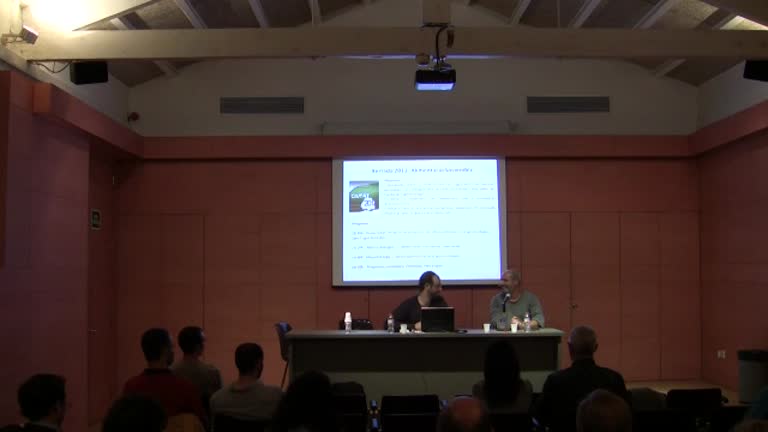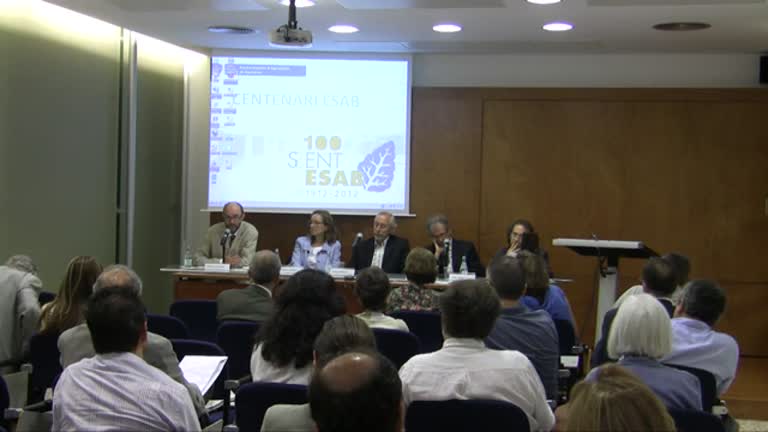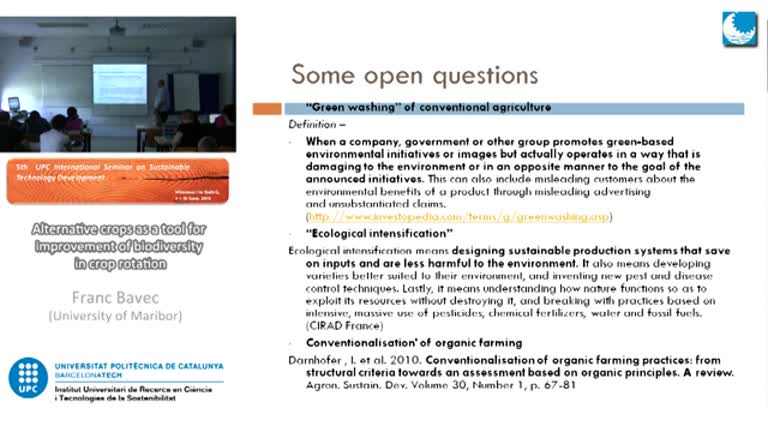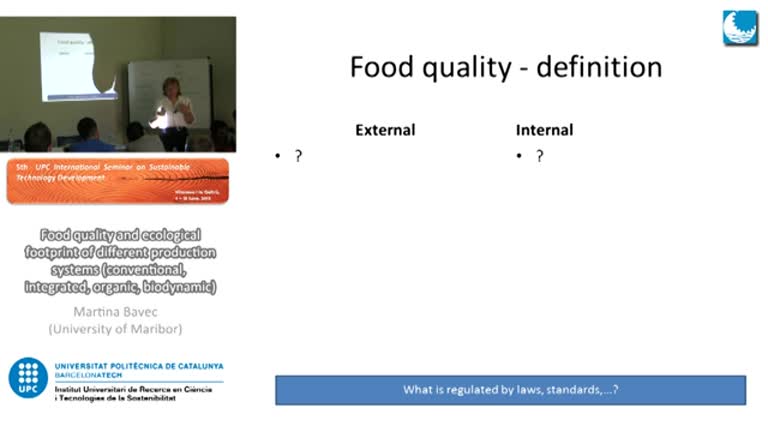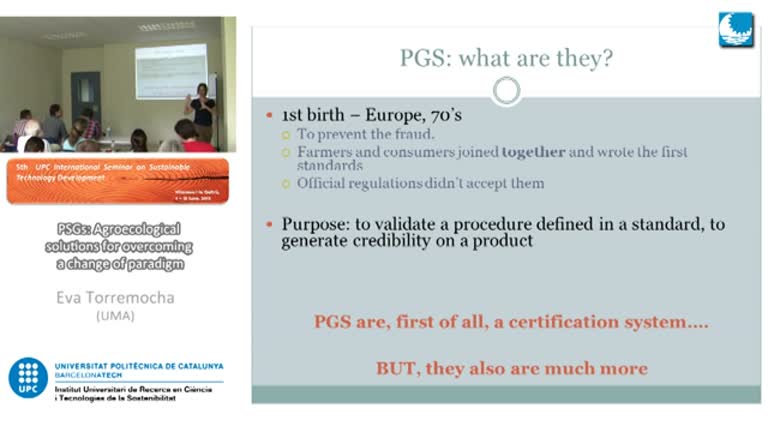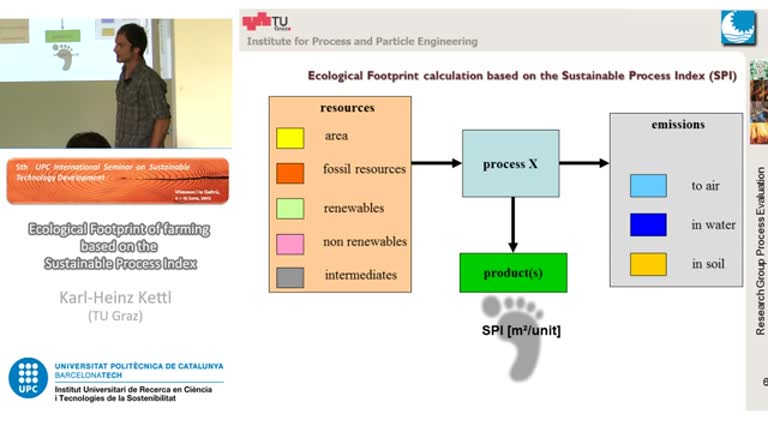Objectes multimèdia amb l’etiqueta: Enginyeria agroalimentària
Resultats de la cerca
Raons per a una alimentació ecològica
Accés obert
30 d’abr. 2015
Xerrada en motiu de l'acte de commemoració del 10è aniversari de la Biblioteca del Campus Universitari de Manresa (BCUM-UPC)
Taula rodona ben parada de racons per alimentar-se amb productes ecològics
Taula rodona ben parada de racons per alimentar-se amb productes ecològics
L'aqüicultura, un sector emergent
Accés obert
24 d’abr. 2013
L’aqüicultura és el cultiu d’organismes aquàtics, incloent peixos, crustacis, mol·luscs i plantes aquàtiques. El cultiu implica la intervenció de l’home en el procés de cria per augmentar la producció, en operacions com la sembra, l’alimentació, etc.
L’aqüicultura és el sector de producció d’aliments que està creixent més ràpidament segons l’Organització de les Nacions Unides per a l’Agricultura i l’Alimentació (FAO). A Catalunya la cria de peix representa una part molt petita de la indústria pesquera catalana, però com és la convivència entre pescadors i el sector aqüícola? Quins avantatges aporta l’aqüicultura? Trobem les claus d’aquesta convivència i els reptes de futur del sector en aquest vídeo.
L’aqüicultura és el sector de producció d’aliments que està creixent més ràpidament segons l’Organització de les Nacions Unides per a l’Agricultura i l’Alimentació (FAO). A Catalunya la cria de peix representa una part molt petita de la indústria pesquera catalana, però com és la convivència entre pescadors i el sector aqüícola? Quins avantatges aporta l’aqüicultura? Trobem les claus d’aquesta convivència i els reptes de futur del sector en aquest vídeo.
Recerca en aqüicultura
Accés obert
24 d’abr. 2013
La recerca en els àmbits de la qualitat i la seguretat alimentària en productes del mar és un dels factors claus per al desenvolupament de l’aqüicultura. A Catalunya, la Xarxa de Referència de Recerca i Desenvolupament i Innovació en Aqüicultura (XRAq) és una entitat creada per la Generalitat de Catalunya que té com a objectiu promoure la recerca interdisciplinària en l’àmbit de l’aqüicultura.
Un dels grups de recerca que forma part d'aquesta xarxa és el grup d’Aqüicultura i Qualitat dels Productes Aquàtics (AQUAL) de la UPC, que orienta la seva activitat en el disseny de sistemes d’aqüicultura per al benestar animal i la sostenibilitat ambiental i en projectes de recerca amb empreses.
Un dels grups de recerca que forma part d'aquesta xarxa és el grup d’Aqüicultura i Qualitat dels Productes Aquàtics (AQUAL) de la UPC, que orienta la seva activitat en el disseny de sistemes d’aqüicultura per al benestar animal i la sostenibilitat ambiental i en projectes de recerca amb empreses.
Espècies aqüícoles a Espanya
Accés obert
23 d’abr. 2013
El musclo gallec és el producte d'aqüicultura més conegut d’Espanya, i
aglutina el 70% de la producció nacional, però no és l’únic. Espècies com
l'orada, el llobarro o el turbot es conreen en instal·lacions aqüícoles del
nostre país.
La situació geogràfica d’Espanya, l’abundància de costes i la riquesa de les
seves aigües afavoreixen una gran varietat de zones per a la cria d’espècies,
tal i com ens explica en aquest vídeo **Lourdes Reig** , investigadora del
[Departament d'Enginyeria Agroalimentària i Biotecnologia
](http://deab.upc.edu/)[
](http://deab.upc.edu/)de la UPC, que identifica les principals espècies de la
producció aqüícola del nostre país.
El musclo gallec és el producte d'aqüicultura més conegut d’Espanya, i aglutina el 70% de la producció nacional, però no és l’únic. Espècies com l'orada, el llobarro o el turbot es conreen en instal·lacions aqüícoles del nostre país.
La situació geogràfica d’Espanya, l’abundància de costes i la riquesa de les seves aigües afavoreixen una gran varietat de zones per a la cria d’espècies, tal i com ens explica en aquest vídeo Lourdes Reig, investigadora del Departament d'Enginyeria Agroalimentària i Biotecnologia de la UPC, que identifica les principals espècies de la producció aqüícola del nostre país.
aglutina el 70% de la producció nacional, però no és l’únic. Espècies com
l'orada, el llobarro o el turbot es conreen en instal·lacions aqüícoles del
nostre país.
La situació geogràfica d’Espanya, l’abundància de costes i la riquesa de les
seves aigües afavoreixen una gran varietat de zones per a la cria d’espècies,
tal i com ens explica en aquest vídeo **Lourdes Reig** , investigadora del
[Departament d'Enginyeria Agroalimentària i Biotecnologia
](http://deab.upc.edu/)[
](http://deab.upc.edu/)de la UPC, que identifica les principals espècies de la
producció aqüícola del nostre país.
El musclo gallec és el producte d'aqüicultura més conegut d’Espanya, i aglutina el 70% de la producció nacional, però no és l’únic. Espècies com l'orada, el llobarro o el turbot es conreen en instal·lacions aqüícoles del nostre país.
La situació geogràfica d’Espanya, l’abundància de costes i la riquesa de les seves aigües afavoreixen una gran varietat de zones per a la cria d’espècies, tal i com ens explica en aquest vídeo Lourdes Reig, investigadora del Departament d'Enginyeria Agroalimentària i Biotecnologia de la UPC, que identifica les principals espècies de la producció aqüícola del nostre país.
Pesca o cultiu? En sabem prou?
Accés obert
24 de febr. 2013
L'augment de la demanda mundial de peix, l’estancament de les zones pesqueres i la sobreexplotació de les espècies més consumides han propiciat el creixement de l’aqüicultura en els darrers anys.
Tot i que el sector aqüícola representa a nivell mundial la meitat de la producció de peix que es consumeix, sovint conviu amb el recel i la manca d’informació. Sabem quin peix comprem? És de cultiu o salvatge? Tenim molta informació dels productes de l’hort, però què en sabem dels que provenen del mar? Aspectes com la traçabilitat, la qualitat o bé la frescor del peix de cultiu aporten al consumidor confiança i seguretat, tal i com ens explica Lourdes Reig, investigadora del Departament d'Enginyeria Agroalimentària i Biotecnologia de la UPC, que també identifica els avantatges que els sistemes de producció de l’aqüicultura aporten per evitar paràsits com l’anisakis.
Tot i que el sector aqüícola representa a nivell mundial la meitat de la producció de peix que es consumeix, sovint conviu amb el recel i la manca d’informació. Sabem quin peix comprem? És de cultiu o salvatge? Tenim molta informació dels productes de l’hort, però què en sabem dels que provenen del mar? Aspectes com la traçabilitat, la qualitat o bé la frescor del peix de cultiu aporten al consumidor confiança i seguretat, tal i com ens explica Lourdes Reig, investigadora del Departament d'Enginyeria Agroalimentària i Biotecnologia de la UPC, que també identifica els avantatges que els sistemes de producció de l’aqüicultura aporten per evitar paràsits com l’anisakis.
[SC 2012] La Ciència en primera persona : 'Medicanes' possibles huracans a la Mediterrània
Accés obert
21 de nov. 2012
Conferència duta a terme dins el marc de la Setmana de la Ciència 2012 a l'EPSEVG. A càrrec de Dani Ramírez, del programa Espai Terra (TV3).
Alimentació sostenible
Accés obert
19 d’oct. 2012
El 19 d'octubre de 2012 a la ciutat de Terrassa, la Càtedra UNESCO de Sostenibilitat, l'Ajuntament de Terrassa, CESIRE *. AULATEC, aula de recursos de Tecnologia del Departament d'Ensenyament de la Generalitat de Catalunya i el Museu de la Ciència i de la Tècnica de Catalunya (mNACTEC), organitzen la Tercera Xerrada reciclar Ciutat "Alimentació Sostenible".
L’objectiu d’aquest esdeveniment és reflexionar sobre les ciutats, sobre els seus cicles metabòlics i les bones pràctiques del dia a dia. Es pretén aprofundir sobre la revalorització de l'agricultura en entorns periurbans i les sinergies amb activitats formatives i educatives en l'àmbit de l'agroecologia, així com debatre l'actual crisi del sector pesquer analitzant els principals reptes i propostes que estan en discussió.
La benvinguda a l'acte la dóna Luís Rodrigues, representant de Barrinar Cap a la Sostenibidat, Jordi Regalés Barta, del Departament d'Ensenyament de la Generalitat de Catalunya i Carme Prats, Cap d'Exposicions, Acció Educativa i Projectes del Museu de la Ciència i de la Tècnica de Catalunya (mNACTEC).
Cicle de xerrades Reciclar ciutat 2012
L’objectiu d’aquest esdeveniment és reflexionar sobre les ciutats, sobre els seus cicles metabòlics i les bones pràctiques del dia a dia. Es pretén aprofundir sobre la revalorització de l'agricultura en entorns periurbans i les sinergies amb activitats formatives i educatives en l'àmbit de l'agroecologia, així com debatre l'actual crisi del sector pesquer analitzant els principals reptes i propostes que estan en discussió.
La benvinguda a l'acte la dóna Luís Rodrigues, representant de Barrinar Cap a la Sostenibidat, Jordi Regalés Barta, del Departament d'Ensenyament de la Generalitat de Catalunya i Carme Prats, Cap d'Exposicions, Acció Educativa i Projectes del Museu de la Ciència i de la Tècnica de Catalunya (mNACTEC).
Cicle de xerrades Reciclar ciutat 2012
Els reptes de la investigació agrària i alimentària de Catalunya per a les properes dècades
Accés obert
22 de juny 2012
Alternative crops as a tool for improvement of biodiversity in crop rotation
Accés obert
13 de juny 2012
PSGs : agroecological solutions for overcoming a change of paradigm
Accés obert
11 de juny 2012
Participatory Systems of Guarantee (PSGs) arise when proposed by civil society, revolving around the production and commercialization of ecological foods. They are constructed as an alternative to the model of certification by a third party, in order to guarantee that productive initiatives which are not covered by the official system are still able to access the certified product sector / market.
Their dynamism is that they are constantly evaluating and reviewing their structures and procedures, as a result of their constant interaction with their environment. Given this characteristic, in reality PSGs are reaching great levels of complexity, not only internally – as part of the same system – but in a global sense, where organizations are using a number of them in line with diverse criteria.
Their social design and focus on the system, as well as the sensitivity that they show for processes of co-evolution, allow us to visualize them as one of the possible tools that will permit the transition from one system to another.
The systems themselves (integrated in political agroecology), and the activities that they encourage, widen the options for agroecological approaches. These can then be applied in territories that are working towards greater sustainability.
Their dynamism is that they are constantly evaluating and reviewing their structures and procedures, as a result of their constant interaction with their environment. Given this characteristic, in reality PSGs are reaching great levels of complexity, not only internally – as part of the same system – but in a global sense, where organizations are using a number of them in line with diverse criteria.
Their social design and focus on the system, as well as the sensitivity that they show for processes of co-evolution, allow us to visualize them as one of the possible tools that will permit the transition from one system to another.
The systems themselves (integrated in political agroecology), and the activities that they encourage, widen the options for agroecological approaches. These can then be applied in territories that are working towards greater sustainability.


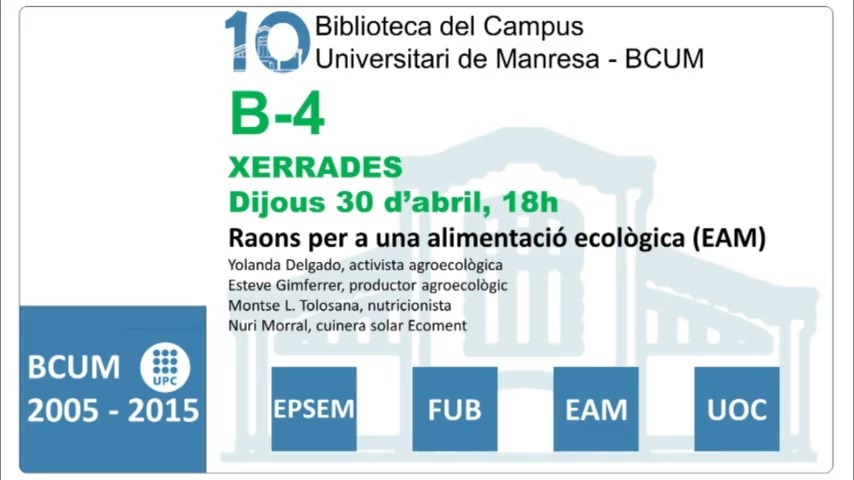
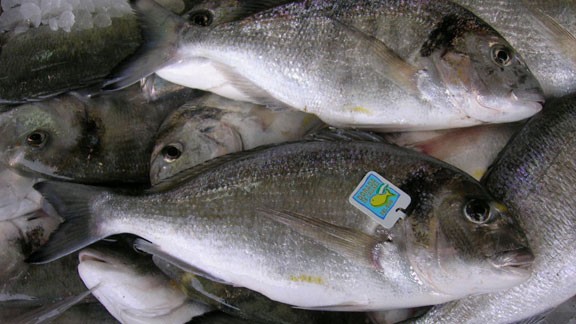
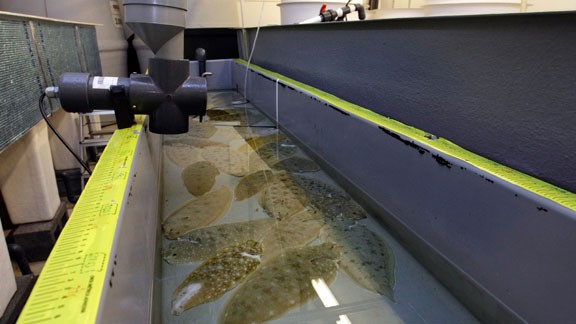
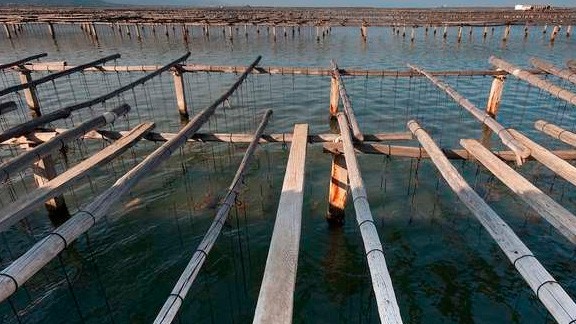
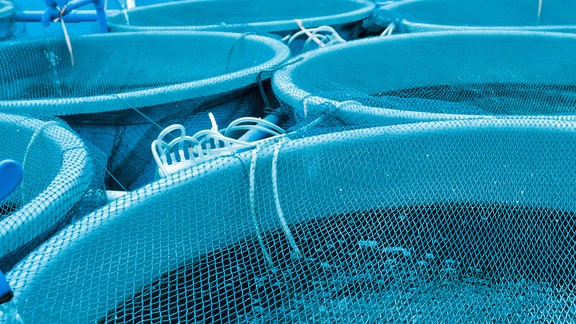
![[SC 2012] La Ciència en primera persona : 'Medicanes' possibles huracans a la Mediterrània](/uploads/pic/series/6040aa649e8fe0002b5e5184/video/604274179e8fe0115069e6c0/210305195818.jpg)
